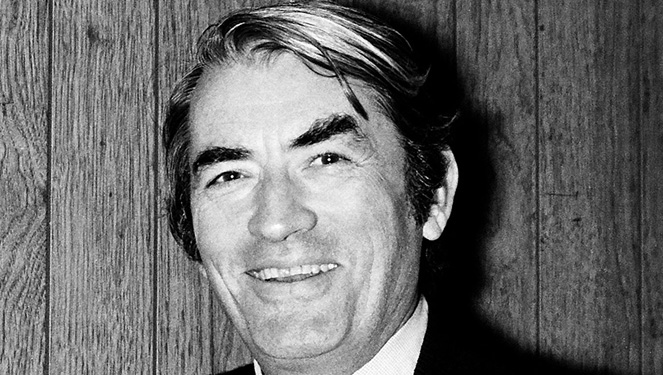
- Industry
Gregory Peck
Eldred Gregory Peck (born on April 5, 1916 in La Jolla, California, died on June 12, 2003) had a long and illustrious career as a Hollywood movie star; he was a tall, dark and handsome leading man, widely admired for his rectitude and his commitment to liberal causes. In Spellbound (1945) directed by Alfred Hitchcock, he played an honest man accused of murder, opposite Ingrid Bergman. In a 1998 interview with journalists of the Hollywood Foreign Press, he was humble about his early performances: “I was already a star, but I had not yet got a hold of the art of screen acting. I’ve seen early footage of Cary Grant, Clark Gable, even Spencer Tracy, when they had not yet found their personality, and I put Spellbound in that category. I had good training in New York with a great teacher, Sanford Meisner, then I did summer stock and road companies, and finally three shows on Broadway. So my aim has always been to be a good actor, not a good-looking movie star; and consistently all the way I tried to improve and become a better actor, deeper and more entertaining, to tell the story with humor and feelings in the best way possible.”
Peck was undeniably a sexy movie star when paired with Jennifer Jones in the western Duel in the Sun (1946), Ava Gardner in The Snows of Kilimanjaro (1952), Audrey Hepburn in Roman Holiday (1953) by William Wyler, Lauren Bacall in Designing Woman (1957) by Vincent Minnelli, Sophia Loren in Arabesque (1966) by Stanley Donen. As an old man he still romanced Jane Fonda in Old Gringo (1989), the film adapted from the novel by Carlos Fuentes.
Gregory Peck has fond memories of working with a young Audrey Hepburn in her first screen role: “Roman Holiday remains the happiest time of my film career, I was happy to play a romantic comedy with Audrey. In a sense I felt that she was a ballet dancer and I was the male partner holding her hand as she did her spins and pirouettes. So it was a wonderful experience.”
He was a western hero in Yellow Sky (1948) by William Wellman, The Gunfighter (1950) by Henry King, The Big Country (1958) by William Wyler. He played a priest in Keys of the Kingdom (1944), then Captain Ahab in Moby Dick (1956) by John Huston. As a devout Roman Catholic, he responded to the themes of the 1851 novel by Herman Melville: “It’s the great American novel, with Huckleberry Finn by Mark Twain. It deals with the eternal mysteries: Who are we, where do we come from? The great obsession of Ahab is to do battle with the whale, because in his mind it was a symbol of an unfeeling, unthinking, malevolent Almighty.” Peck addressed the issue of anti-Semitism in Gentleman’s Agreement (1947) by Elia Kazan, then portrayed a decent American lawyer who defended a black man falsely accused of raping a white woman in To Kill A Mockingbird (1962) from the novel by Harper Lee.
He expressed his hope for the future to the HFPA: “My dream is the same as Martin Luther King’s, that one day we will accept people regardless of race, religion or creed, actually have one society across the board. I hope that in the next 25 or 50 years we will make accelerated progress in that direction.”
A gentleman from the old school, Peck remembered how in Hollywood’s golden era movie stars were paid a fraction of today’s multi-million dollar salaries: “I don’t think anybody is worth $20 million a picture, to me that’s astonishing. In my day fellows like Clark Gable, Humphrey Bogart, Gary Cooper worked for about $3500 a week, and when they passed on to the great beyond, they left relatively small estates.”
A devoted family man, Peck had three sons from his first marriage to Finnish-born Greta Kukkonen: Jonathan, born in 1944 committed suicide in 1975, Stephen, born in 1945, Carey, born in 1949. In 1955 he married Veronique Passani, 23, who had interviewed him for France Soir
He loved to tell the amusing story that when he was back in Paris and called Veronique to ask her to lunch, she hesitated. She later told him that on the same day she had an interview with Albert Schweitzer at the apartment of Jean Paul Sartre, but gave the assignment away; and he replied: “You made the right choice, kiddo.” Happily married for 48 years until his death at age 87 (Veronique passed away in 2012 at age 80), Peck explained: “My first marriage was not successful, although I had three fine boys, it was a mismatch, unfortunately; I don’t think I was a very good husband. But luckily I met the right woman, this charming, beautiful, smart girl, who was sent to interview me, and the family joke is that the interview is still going on. Our marriage works because my wife has that certain French logic, and she’s also frugal, which I am not, so it turned out to be a good match.”
When he was in his 80s, Peck conducted a series of public conversations with his fans, documented on a 1999 film by his daughter Cecilia Peck and filmmaker Barbara Kopple, available on the Legacy DVD of To Kill A Mockingbird. He was doing this, he said: “To keep interested in things ahead that are a bit of a challenge, otherwise, if you settle down in the old easy chair, you fall apart.”
The Hollywood Foreign Press voted him World Film Favorite in 1951 and 1955, honored him with the Cecil B deMille Life Achievement Award in 1969. He also received 3 Golden Globes: As Best Actor for The Yearling in 1946 and To Kill a Mockingbird in 1962, as Supporting Actor for Moby Dick (TV) in 1998, and 3 had nominations, for Captain Newman, M.D. in 1963, MacArthur in 1977, The Boys from Brazil in 1978.